This statement may make many of you mad.
I feel like it’s something that needs to be said though – something that too many people are afraid to say.
You see, dogs are dogs.
Despite what you may think, dogs don’t feel human emotions, revenge, spite, or do things “they know are wrong” just to make you mad.
Those beliefs are brought about when people try to humanize, or anthropomorphize ( to attribute human form or personality to) their dogs.
Dogs do what they are bred to do.
Dogs do what they know they can get away with.
They do what they can when the option they would, or should, choose is not available.
There are several reasons your dog’s bad behavior may be your fault.
Bear with me here.
Here are some common scenarios and behaviors that people often blame their Dachshund for when it’s really their own fault.
Your Dachshund Has Accidents in the House
It’s true that there will be mistakes when a dog is a puppy and just learning.
However, when puppies have accidents in the house, and especially when older “potty trained” dogs do, it is most often your fault.
In both cases, it’s likely that there were signs before your Dachshund went potty in the house.
Maybe they started to sniff a little more. Perhaps they wandered off into another room. Perhaps they merely sat and stared at you from the rug.
If they go potty in the house, they likely sent cues that you missed.
Your dog likely showed signs they needed to go to the bathroom before their accident.
As a long-time Dachshund owner I can empathize. Sometimes the signals are so subtle that they’re almost indistinguishable from normal behavior.
It’s your job to be a detective though.
I know it can be hard but it’s up to you to pay keen attention to what exactly happens before the potty accident happens.
Once you figure out your Dachshund’s “signals”, it’s up to you to watch their behavior closely and immediately take them out to go potty when they do that thing.
Another mistake is waiting for your Dachshund to “tell you” they need to go outside or letting them choose whether or not they go out.
If you know that your Dachshund has accidents in the house every 4 hours, then you should take them outside every three.
If they have accidents every hour, then you need to take them out every 30 minutes.
It’s up to you to take them out before the accidents occur.
Reading your Dachshund’s signs that something may be wrong is your job as their owner.
If you think your Dachshund needs to go potty and they just stand there when you open the door – which may happen frequently when it’s cold or raining – it’s up to you to make sure they go out anyway.
Physically carry them outside if you have to. Put them on a leash, lead them out into the yard, and stand in one place until they go if you have to.
If they don’t go potty, take them out every 15 minutes until they do if you have to.
Another one I was guilty of was not recognizing that accidents in the house were related to my Dachshund’s separation anxiety.
If your Dachshund pees or poops in the house as soon as you leave, especially if you just took them out to go potty, the cause is most likely separation anxiety.
Of course, there are always reasons or circumstances that may lead to your Dachshund going potty in the house that you can’t control.
If having potty accidents in the house is a new behavior, a visit to a veterinarian to rule out medical causes is important.
If there has been a sudden change in your Dachshund’s behavior, or you’ve truly tried everything and nothing is working, then take your dog to the vet to rule out any medical reasons.
Things like urinary tract infections, incontinence, and dementia can affect your dog’s ability to go potty where and when it’s appropriate.
You can help pinpoint these things, or rule them out, by visiting your veterinarian.
Your Dachshund Chews Everything
There are several reasons why it’s natural for Dachshunds to chew things:
- A Dachshund was bred for hunting so they are inclined to “kill” and chew up vermin
- Puppies may need to chew to help soothe their gums and growing teeth
- Older dogs often chew to keep their jaws strong and teeth clean
- Most dogs chew to relieve anxiety or boredom
With Dachshunds, It’s more about managing the situation than trying to get them to stop chewing. At least your efforts will be less futile if you work with them instead of trying to bend their behavior to your will.
The first step is determining why they are chewing.
If your Dachshund is having a chewing problem, you need to figure out why.
The second step is redirecting them to something appropriate to chew, changing the situation so they don’t have access to the thing they chew, or reducing boredom and anxiety.
Chewing tendencies can almost always be minimized by making sure your Dachshund is getting plenty of exercise and mental stimulation during the day.
If you’re walking your Dachshund regularly and their chewing tendencies still seem out of control, they may be telling you that they are not getting enough exercise.
Note: in the case of a puppy, you will be limited to the amount of walking you can do. The general rule is 5 minutes for every month of age.
If you think your dog may be chewing because they are bored, consider incorporating daily sessions with a puzzle toy they have to use their brain to figure out. K9 Nosework can also be a fun game for both of you.
Mental stimulation can be almost as tiring, or sometimes moreso, than physical exertion for a dog.
If Your Dachshund is chewing things they shouldn’t be and you are home, redirect them to something they are allowed to chew like a toy especially made for that purpose.
Try distracting or redirecting your dog when they chew on something they shouldn’t.
You can put bitter spray on things they are not supposed to chew like furniture. This will deter them from the activity.
But again, depending on the reason, you may need to give them something appropriate to chew on instead.
Eventually they will catch on to what they are and aren’t supposed to chew.
If your Dachshund is chewing up things when you leave the house, that is almost always due to boredom or anxiety.
Use counter-conditioning to reduce anxiety, and/or give them a calming supplement like Hemp CBD for dogs or Vetriscience Composure (affiliate link so I receive a small commission if you purchase) to help make them less anxious.
If you’re not home, train them to stay in a crate or keep them to one room where they can’t do damage.
If you are worried about them chewing toys, keep an eye on them to make sure they don’t swallow pieces and consider just leaving the toys down for a short time.
Consider only leaving toys out for your Dachshund when you can monitor them.
With many of our toys, I allow them out when I am actively playing with my dog. If left alone with the toy, they will eat it so if I am not actively playing with them it goes back in the toy box.
Your Dachshund Barks for Attention, Etc.
Dachshunds do things because they’ve figured out that it works.
If your Dachshund barks at you while you are eating, they learned somewhere or sometime that it resulted in tasty foodstuffs coming their way.
Maybe a family member at your house, or a friend when you were visiting others, gave them a morsel when they looked at them with sad eyes and barked.
If your dog barks when you are not petting them, then they likely somehow learned that barking until they annoy you means that you will give in and give them a pat on the head, put them in your lap, or otherwise give them attention.
Dogs will take any attention they can get, including negative attention.
Keep in mind that, in a dog’s eyes, negative attention is better than no attention. Therefore, by scolding them, you may have been reinforcing that barking at you results in attention.
There are many other scenarios where your Dachshund may bark at you to “demand” things.
The key is figuring out when and where they learned that doing that gets them what they want and doing something different.
If your dog barks at you until you give them food, don’t ever give them food when they do it. I mean ever.
A Dachshund is very smart and they learn that if it works once, it may work again sometime so they should keep trying.
A couple potential solutions are to only give them food when you are not eating (like their snacks or dinner) or make them sit and be quiet before giving them anything.
If your dog is barking to get attention, one really good solution is to quietly leave the room. Don’t look at them or acknowledge the barking.
You don’t necessarily have to stay out of the room for a long time. You just want them to get the idea that barking for attention gets them exactly the opposite of what they were hoping for.
Be consistent with whichever training method you choose.
Again, consistency is key.
Refusing to Walk on Leash, with a Jacket On, Etc.
This one can be a little more trouble to identify the cause and fix it.
Sometimes though, it’s as simple as them learning if they refuse to walk, or otherwise cause a scene, that you won’t make them.
Now, I’m definitely not condoning “forcing” your dog to do anything or resorting to abuse to scare them into complying or submitting.
However, there are several ways, other than giving up, that you can coax your Dachshund into at least semi-willingly walking.
If your Dachshund refuses to walk with a specific jacket or harness on, it may be because it feels uncomfortable.
The first thing to do is make sure that it’s not too constricting or rubbing them in an uncomfortable way. If it’s not, and they are still refusing to budge, maybe try a different model or design.
Try having your Dachshund wear a jacket or harness at home before trying it on a walk.
You can also get a dog used to wearing a harness, jacket, sweater, or clothes outside buy introducing it slowly in the house.
Put the thing on in the house, give your Dachshund copious amounts of treats while they have it on, and take it off after a few minutes.
You can then extend the time they have it on and eventually move to a similar exercise outdoors.
There are also a couple of ways you can coax your Dachshund into walking in the piece of clothing or harness to show them that it’s not going to kill them.
One way is to go for a short walk while luring them with treats. I’ve done this before with many Dachshunds.
I hold a treat in front of them, close enough that they want to walk towards it (that may be only a few inches at first), and reward them with the treat for walking toward me.
Once that starts to work, I extend the distance away I stand with the treat to get them to walk.
Treats can be useful for bribing your Dachshund to walk. Once they walk in a harness or jacket several times, they may learn that it isn’t so bad after all.
Another way is to carry your Dachshund a block or two from the house and make them walk back on their own. I’ve found that Dachshunds are more motivated to walk toward home than they are away from it.
This is especially true if you are taking them for a walk right before dinner time. Their internal clocks seem to know when it’s time to eat and where to find food.
Conclusion
There are many other things your Dachshund may be doing, or may be refusing to do, that are actually your fault.
Don’t get discouraged or feel guilty though. When we know better, we do better.
The first step is taking a look at the when and where surrounding the undesirable behavior or activity.
If your Dachshund is doing something you don’t like, an important first step is to take a look at when it’s happening and what you are doing to make sure you aren’t unwittingly encouraging the behavior.
Then take a look at what role you may be playing to unknowingly “enable” or reinforce this behavior in your Dachshund.
Then change things – change your dog’s circumstances or change the way you do things. Try something new. Try something different.
As the saying goes, “Insanity is doing the same thing over and over again and expecting different results.”
(Note: often attributed to Albert Einstein but more likely from writer Rita Mae Brown)
Fixing many behavior problems are as simple as that.
Do keep in mind though that sudden changes in behavior may be due to underlying medical conditions. Take your Dachshund to the vet if you suspect something else is amiss.
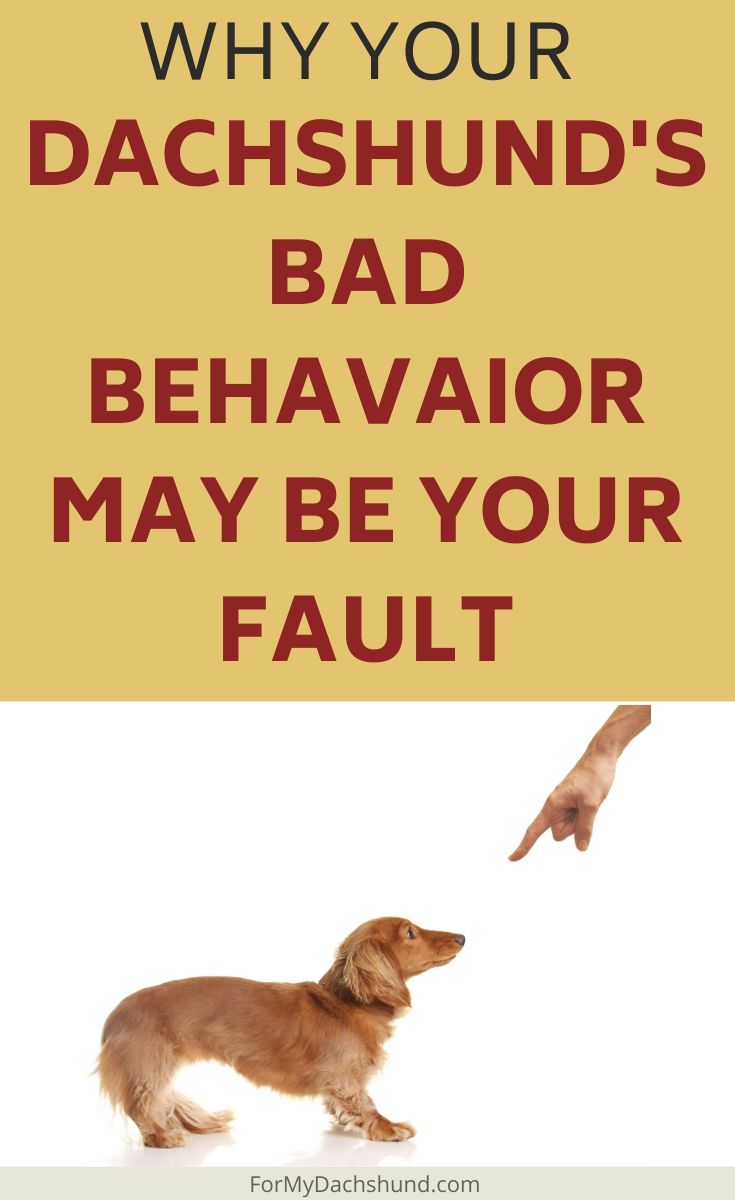
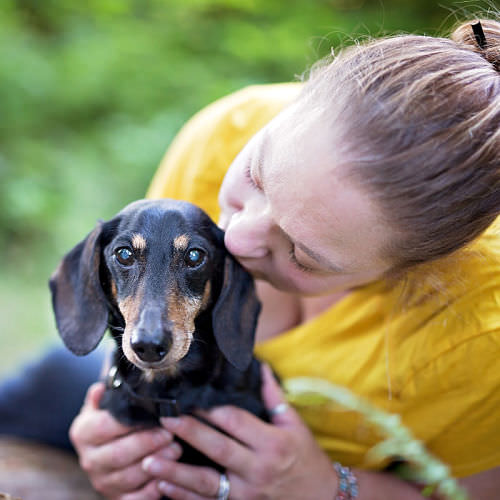
About the Author: Through her 17 years of owning and caring for Dachshunds, and almost 10 years researching and writing about them, JW has become a respected expert in the Dachshund community. Read more about her here.

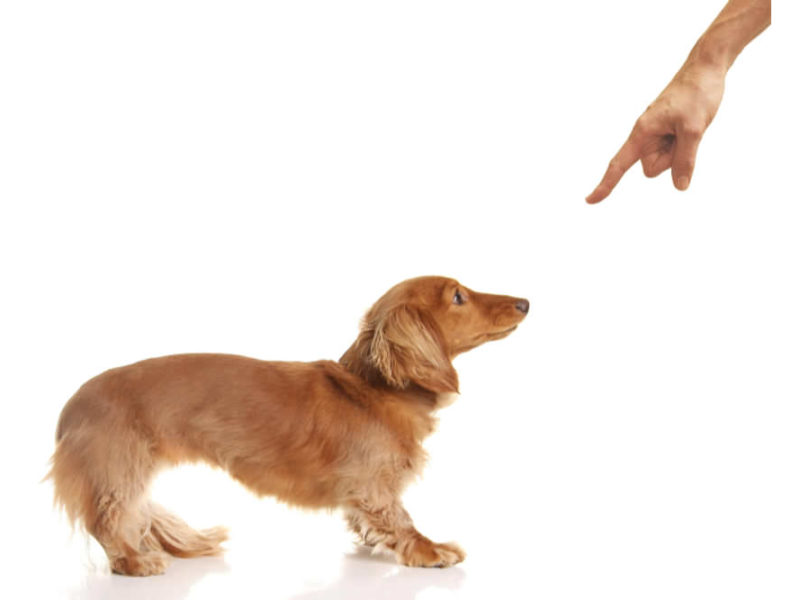
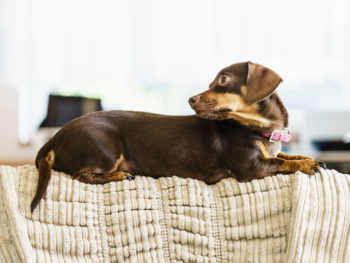

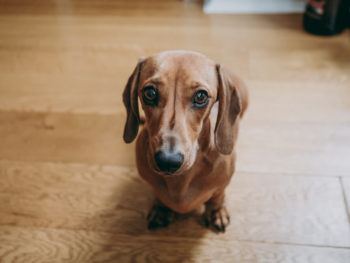
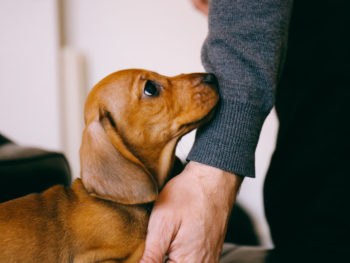


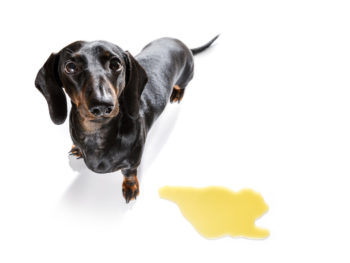

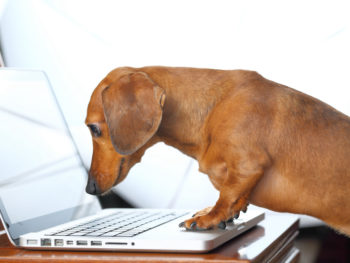
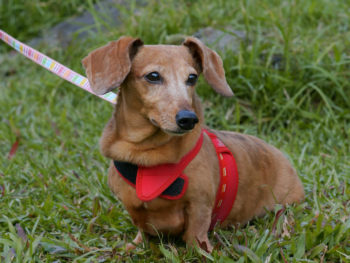

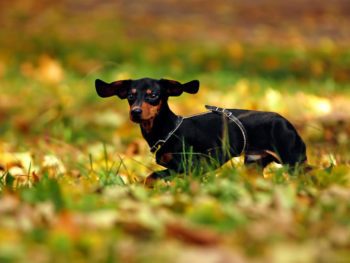
 Lafora Disease in Dachshunds: What You Need to Know
Lafora Disease in Dachshunds: What You Need to Know


